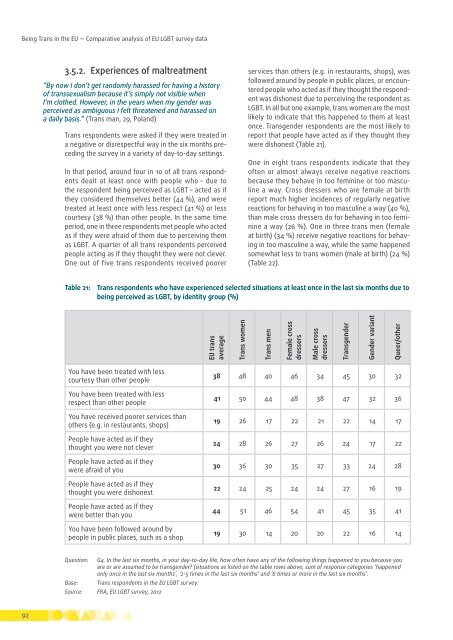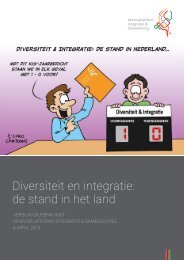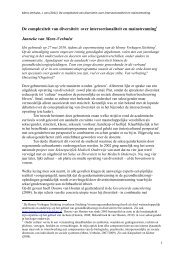fra-2014-being-trans-eu-comparative_en
fra-2014-being-trans-eu-comparative_en
fra-2014-being-trans-eu-comparative_en
Create successful ePaper yourself
Turn your PDF publications into a flip-book with our unique Google optimized e-Paper software.
Being Trans in the EU — Comparative analysis of EU LGBT survey data3.5.2. Experi<strong>en</strong>ces of maltreatm<strong>en</strong>t“By now I don’t get randomly harassed for having a historyof <strong>trans</strong>sexualism because it’s simply not visible wh<strong>en</strong>I’m clothed. However, in the years wh<strong>en</strong> my g<strong>en</strong>der wasperceived as ambiguous I felt threat<strong>en</strong>ed and harassed ona daily basis.” (Trans man, 29, Poland)Trans respond<strong>en</strong>ts were asked if they were treated ina negative or disrespectful way in the six months precedingthe survey in a variety of day‐to‐day settings.In that period, around four in 10 of all <strong>trans</strong> respond<strong>en</strong>tsdealt at least once with people who – due tothe respond<strong>en</strong>t <strong>being</strong> perceived as LGBT – acted as ifthey considered themselves better (44 %), and weretreated at least once with less respect (41 %) or lesscourtesy (38 %) than other people. In the same timeperiod, one in three respond<strong>en</strong>ts met people who actedas if they were a<strong>fra</strong>id of them due to perceiving themas LGBT. A quarter of all <strong>trans</strong> respond<strong>en</strong>ts perceivedpeople acting as if they thought they were not clever.One out of five <strong>trans</strong> respond<strong>en</strong>ts received poorerservices than others (e.g. in restaurants, shops), wasfollowed around by people in public places, or <strong>en</strong>counteredpeople who acted as if they thought the respond<strong>en</strong>twas dishonest due to perceiving the respond<strong>en</strong>t asLGBT. In all but one example, <strong>trans</strong> wom<strong>en</strong> are the mostlikely to indicate that this happ<strong>en</strong>ed to them at leastonce. Transg<strong>en</strong>der respond<strong>en</strong>ts are the most likely toreport that people have acted as if they thought theywere dishonest (Table 21).One in eight <strong>trans</strong> respond<strong>en</strong>ts indicate that theyoft<strong>en</strong> or almost always receive negative reactionsbecause they behave in too feminine or too masculinea way. Cross dressers who are female at birthreport much higher incid<strong>en</strong>ces of regularly negativereactions for behaving in too masculine a way (40 %),than male cross dressers do for behaving in too femininea way (26 %). One in three <strong>trans</strong> m<strong>en</strong> (femaleat birth) (34 %) receive negative reactions for behavingin too masculine a way, while the same happ<strong>en</strong>edsomewhat less to <strong>trans</strong> wom<strong>en</strong> (male at birth) (24 %)(Table 22).Table 21: Trans respond<strong>en</strong>ts who have experi<strong>en</strong>ced selected situations at least once in the last six months due to<strong>being</strong> perceived as LGBT, by id<strong>en</strong>tity group (%)EU <strong>trans</strong>averageTrans wom<strong>en</strong>Trans m<strong>en</strong>Female crossdressersMale crossdressersTransg<strong>en</strong>derG<strong>en</strong>der variantQueer/otherYou have be<strong>en</strong> treated with lesscourtesy than other peopleYou have be<strong>en</strong> treated with lessrespect than other peopleYou have received poorer services thanothers (e.g. in restaurants, shops)People have acted as if theythought you were not cleverPeople have acted as if theywere a<strong>fra</strong>id of youPeople have acted as if theythought you were dishonestPeople have acted as if theywere better than youYou have be<strong>en</strong> followed around bypeople in public places, such as a shop38 48 40 46 34 45 30 3241 50 44 48 38 47 32 3619 26 17 22 21 22 14 1724 28 26 27 26 24 17 2230 36 30 35 27 33 24 2822 24 25 24 24 27 16 1944 51 46 54 41 45 35 4119 30 14 20 20 22 16 14Question:Base:G4. In the last six months, in your day‐to‐day life, how oft<strong>en</strong> have any of the following things happ<strong>en</strong>ed to you because youare or are assumed to be <strong>trans</strong>g<strong>en</strong>der? (situations as listed on the table rows above; sum of response categories ‘happ<strong>en</strong>edonly once in the last six months’, ‘2-5 times in the last six months’ and ‘6 times or more in the last six months’.Trans respond<strong>en</strong>ts in the EU LGBT survey.Source: FRA, EU LGBT survey, 201292









